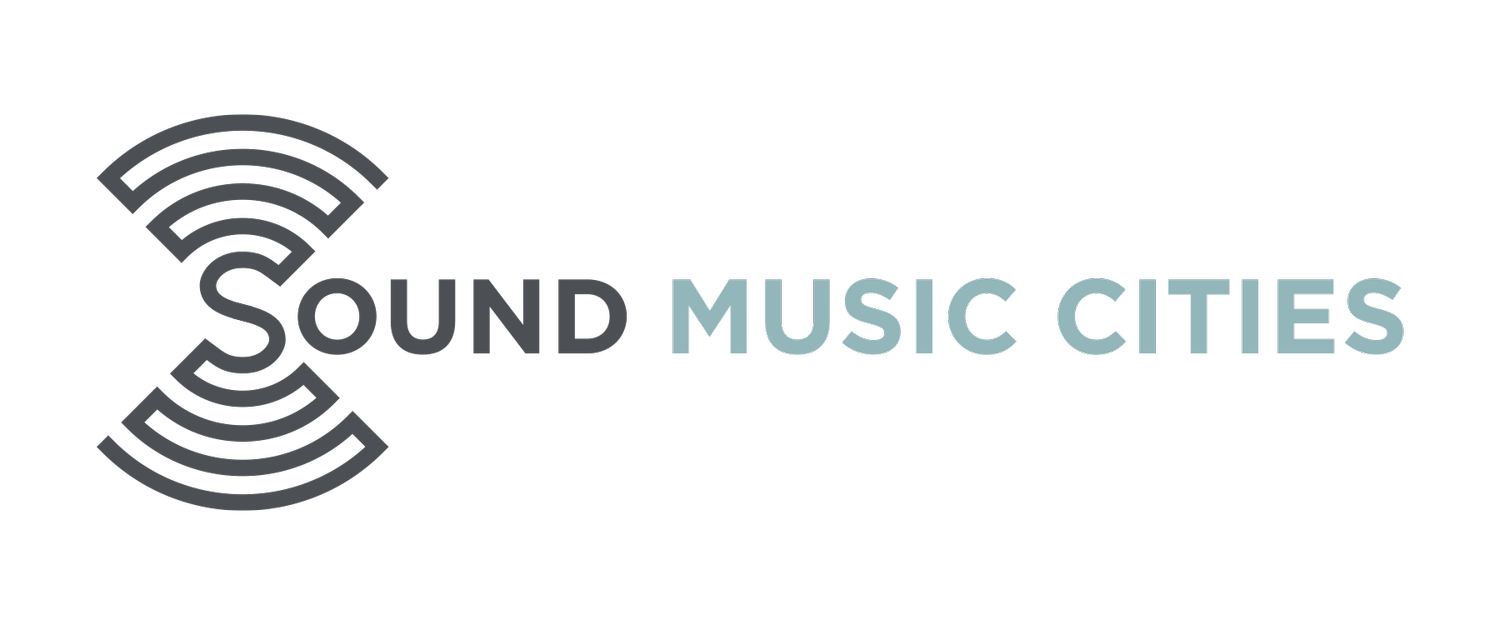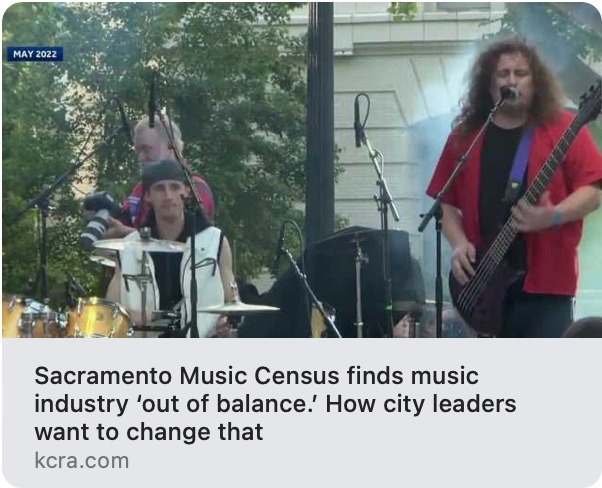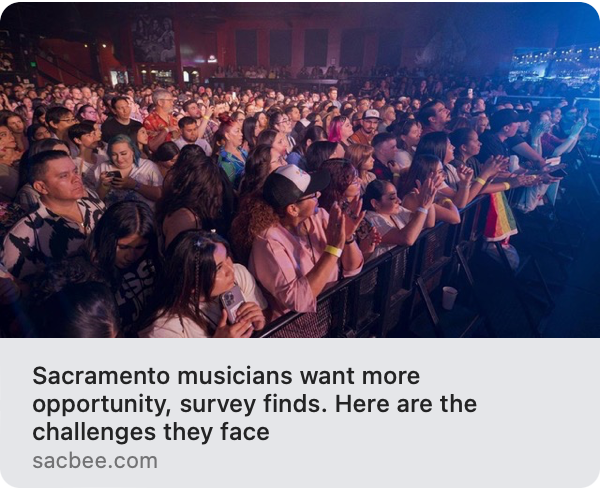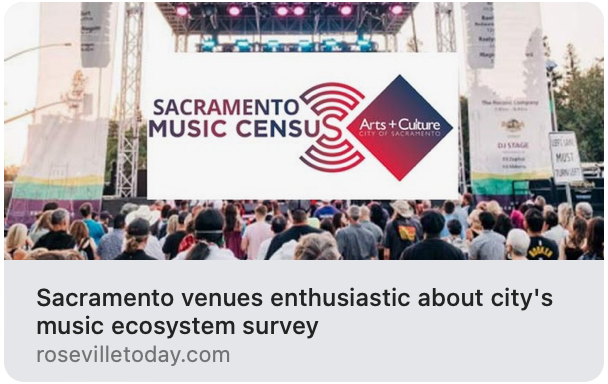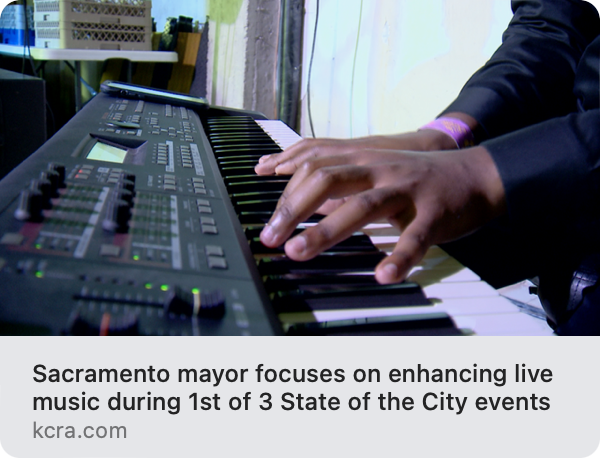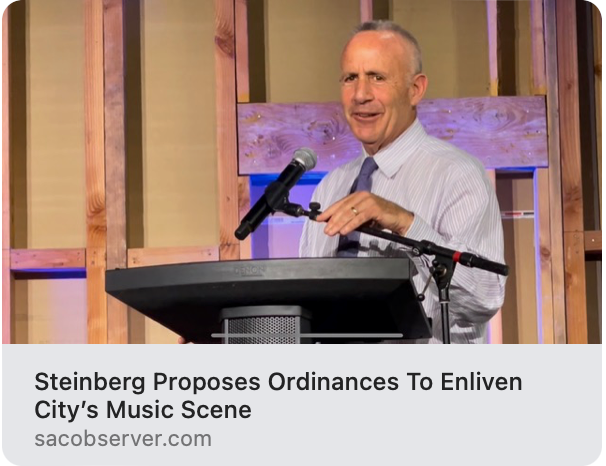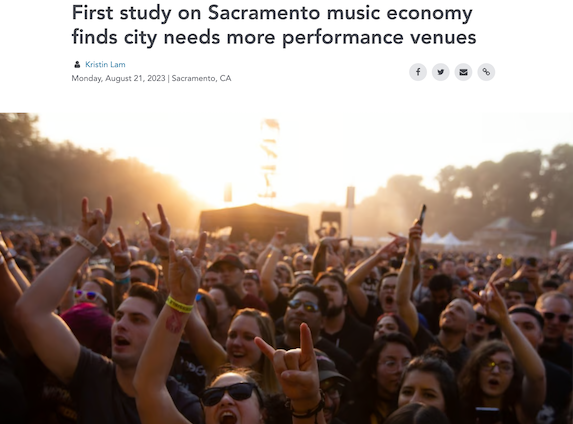Sacramento Music Census Released: Mayor Steinberg Calls for Regulatory Reform
The City of Sacramento recently released the results of its Sacramento Music Census, a survey designed to better understand the present lived experience of people in the music community and their contributions to the creative economy in the capital region. Nearly 1,400 people from the music community responded to the survey, which was in the field in October and November 2022.
Sacramento’s Music Census uncovered several challenges that policymakers and the community can address. For example, there’s some industry development needed in Sacramento, but the first step is to address the regulatory landscape. Of note, Sacramento Mayor Steinberg read the Census Report and embraced it as a call to action and a roadmap for what comes next.
““This Music Census provides a roadmap for what we as a city can do to create more opportunities for artists and make it easier to host live music here. We need to build on the success of large festivals like Aftershock and Golden Sky to foster an ecosystem that nurtures our homegrown talent.””
Mayor Steinberg's call to action based on the Sacramento Music Census:
Make it Easier to Get Permits: Less paperwork.
One City Contact: No more getting passed around.
Online Applications: It’s about time.
Faster Permit Approvals: Speed things up based on the event size.
Simple Permits for Empty Places: Let's use those empty spots for music.
Make it Cheaper: Other cities are cheaper. We can be too.
Keep It Safe: Make sure people feel good and safe at music events.
Mayor Steinberg's call for change in Sacramento's music ecosystem is both commendable and necessary. However, it's essential to recognize that many steps can be taken on the city management side without waiting for directives from the Mayor or the Council.
The Sacramento Music Census results have been enlightening, and it's heartening to see the city leadership respond to its findings. The negative impact of the current regulatory framework was palpable, showing up distinctly in numerous datasets – more so than we've observed in any other city we've worked in.
While we are grateful for the Mayor and the Council's willingness to act, it's also crucial for city management to acknowledge its role and proactively address these regulatory challenges. Together, a collaborative blend of leadership and administrative action can set the stage for music to flourish in Sacramento.
A music census isn’t just a set of statistics; it’s the voice of a community—a tool that policymakers can use to craft more effective, equitable, and vibrant music ecosystems. This is why we do this work, to break down the barriers holding back a local music community.
Media Stories about the Sacramento Music Census and the Mayor’s Actions
KEY FINDINGS
Sacramento's Music Scene Needs Balance
Most survey respondents (78%) are musicians. Only 15% work in the music business and just 7% are from venues.
We need a better balance between the number of musicians and places for them to play.
Rules Are Hurting Local Live Music
Our music scene is stuck because of too many rules. Venues have a hard time hosting live music.
Bars and live music spots are being treated the same, which makes it tough for live music to thrive.
Musicians Love Sacramento, But They Need More Chances
Musicians aren’t making much money from their music. They want more chances to play and better opportunities for everyone.
Creatives Top Needs/Concerns:
More opportunity- 86% have less than 4 gigs per month
More diversity in music income sources beyond live gigs (recording, merchandise, studio work, teaching etc.)
75% of income comes from work outside music
More creative time
52% of creatives can’t find local industry resource providers and 63% need more affordable professional services
Creatives spend an average of $9,251 annually on industry services - 50% of that is spent locally
Desired training: Marketing/Social Media, Booking Promotion, Event Production, Recording Engineering, Publishing/Licensing
Lack of industry affiliation and registration (BMI, ASCAP, SESAC, etc.)
Venues/Presenter’s Needs and Concerns
City-produced regulatory guide- interpretation of requirements, process for permits/ which are needed, etc.
Surprise regulations are an issue
Better communication from the City
Single point of entry for all things music and entertainment-related
More efficient and effective Entertainment License process
Permit costs are too expensive
Type of event should affect terms (tiered system)
Online portal for permit applications
Inclusion in the regulatory design process
Extra cost of conditions to host live music
Uncertain fan interest
Music Industry Needs/Concerns
52% of creatives can’t find local industry service providers
Lack of industry affiliation and registration (Grammys, Chamber of Commerce, etc.)
Industry services directory
Inclusion in the regulatory design process
More professional development
43% of music industry participants who have moved into the area in the past 2 years work remotely but live in Sacramento (and don’t participate in the local ecosystem)
“The findings of the Sacramento Music Census reinforce a lot of what we’ve been hearing anecdotally from the music community in recent years,” said Megan Van Voorhis, Director of Convention and Cultural Services for the City. “But it also gives us a concrete direction for where our energies are best spent to support the local music industry’s recovery – and thankfully there are resources available to act on the findings.
